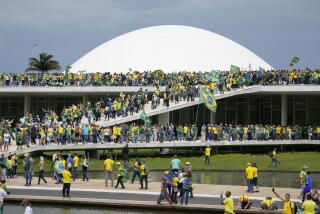Peru inches closer to a trial for Fujimori
- Share via
SANTIAGO, CHILE — A Chilean prosecutor recommended Thursday that former Peruvian President Alberto Fujimori be extradited to Peru, opening the way for him to face charges of corruption and human rights violations allegedly committed while he was chief of state.
Fujimori, now 68, was an obscure rector at an agricultural college when he won a longshot bid for the presidency in 1990. He was a colorful and autocratic figure during the decade he served. His administration routed left-wing guerrillas and helped revive Peru’s economy, but critics say he also was corrupt and brutal, dissolving Congress and dispatching death squads in the name of fighting terrorism.
The prosecutor’s finding was a major victory for the current Peruvian government’s attempt to force Fujimori to answer those charges.
“Time has showed us correct, and now we must allow Chilean justice to act,” Peruvian Foreign Minister Jose Antonio Garcia Belaunde told reporters in Lima, the capital.
The 50-page extradition finding by Chilean state prosecutor Monica Maldonado is nonbinding, but authorities said it would hold great weight with the tribunal assigned to rule on the extradition request. The prosecutor found that Peru had submitted sufficient evidence to warrant extradition of Fujimori on charges of corruption and human rights violations.
Peruvian authorities say Fujimori embezzled millions of dollars from the country while he was president and that he bears responsibility for two massacres -- one at a university campus and another in a Lima neighborhood, Barrios Altos -- that left 25 people dead.
Some funds allegedly ended up in the hands of Fujimori’s ex-intelligence chief, Vladimiro Montesinos, convicted of arms smuggling and other charges and now imprisoned in Lima.
Chilean and Peruvian officials have said they would abide by the ultimate decision of the Chilean justice system.
“This is fundamentally a judicial matter,” said Ricardo Lagos Weber, spokesman for Chilean President Michelle Bachelet, who has refrained from commenting on the proceedings.
The extradition process, which has lasted 18 months so far, has been an extremely sensitive matter between the neighboring rival nations. Chile and Peru have a disputed maritime boundary and lingering bad blood from a 19th century war won by Chile, resulting in Chile’s annexing of a large chunk of Peruvian territory.
Fujimori’s lawyer, Francisco Velozo, downplayed the result as a “necessary step” and emphasized that it was far from the end of the matter.
Fujimori’s daughter Keiko, a Peruvian congresswoman, said she had spoken with her father, who is free on bail, while he was having lunch with some friends. She said he was calm.
Human rights activists and an attorney for the Peruvian government expressed concern that the ruling could prompt Fujimori to flee Chile. Chilean authorities said they would weigh carefully any request to return Fujimori to custody.
Fujimori, the son of Japanese immigrants who settled in Peru, holds Japanese citizenship and fled to Japan after resigning the presidency in 2000. Japan refused repeated requests to extradite Fujimori.
Fujimori arrived in Santiago, the Chilean capital, from Japan in November 2005, saying he was planning to return to Peru and launch a political comeback. But he was quickly arrested on a warrant from Peruvian authorities, who soon filed extradition papers.
He was released on bail after more than six months in custody and has lived here since.
--
Special correspondent Vergara reported from Santiago and Times staff writer McDonnell from Buenos Aires. Special correspondent Adriana Leon in Lima contributed to this report.
More to Read
Sign up for Essential California
The most important California stories and recommendations in your inbox every morning.
You may occasionally receive promotional content from the Los Angeles Times.










